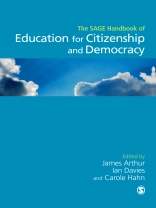This handbook brings together new work by some of the leading authorities on citizenship education, and is divided into five sections. The first section deals with key ideas about citizenship education including democracy, rights, globalization and equity. Section two contains a wide range of national case studies of citizenship education including African, Asian, Australian, European and North and South American examples. The third section focuses on perspectives about citizenship education with discussions about key areas such as sustainable development, anti-racism, gender. Section four provides insights into different characterisations of citizenship education with illustrations of democratic schools, peace and conflict education, global education, human rights education etc. The final section provides a series of chapters on the pedagogy of citizenship education with discussions about curriculum, teaching, learning and assessment.
Mục lục
PART ONE: FOUNDATIONS
Democracy – Bernard Crick
Rights, Duties, Responsibilities – David Carr
Justice – Cynthia Tyson
Philosophical Presuppositions of Citizenship Education and Political Liberalism – Marianna Papastephanou
Diversity and Citizenship Education in Global Times – James A. Banks
Equity and its relationship to Citizenship education – Stephen Gorard and Vanita Sundaram
Globalization – Merry Merryfield with Lisa Duty
PART TWO: GEOGRAPHICALLY BASED REVIEWS – COMPARATIVE RESEARCH
Education for Democratic Citizenship in Australia – Murray Print
Reinventing Freire: Exceptional Cases Of Citizenship Education In Brazil – Daniel Schugurensky and Kathy Madjidi
The Struggle for Citizenship Education in Canada: The Centre Cannot Hold – Andrew S. Hughes and Alan Sears
Citizenship Education In China: Changing Concepts, Approaches and Policies In The Changing Political, Economic and Social Context – Wing On Lee and Ho Chi-hang
Education for Citizenship and Democracy: The Case of the Czech Republic – Martina Klicperová-Baker
Citizenship Education in India: From Colonial Subjugation to Radical Possibilities – – Reva Joshee
Citizenship Education in Israel: A Contested Terrain – Orit Ichilov
Citizenship Education in Japan and Kazuya Taniguchi – Lynne Parmenter, Mitsuharu Mizuyama
Citizenship Education in Malawi: Prospects for Global Education – Penny Enslin and Joseph Jinja Divala
The Changing Face of Citizenship Education in Pakistan – Bernadette Dean
From subjects to Citizens: Citizenship Education in Palestine – Fouad Moughrabi
Local and Global Citizenship in the UK – David Kerr and Christine Twine A Smith
Education for Citizenship and Democracy in the United States – Carole Hahn
PART THREE: PERSPECTIVES, TRADITIONS, DIVERSITY AND DISCIPLINES
Key Perspectives, Traditions and Disciplines: Overview – Elizabeth Frazer
Religion, Citizenship and Hope: Civic Virtues and Education About Muslim Traditions – Farid Panjwani
Christianity, Citizenship and Democracy – James Arthur
Gender, Feminism and Education for Citizenship – Jane Bernard Powers
Anti- Racism – Hugh Starkey
S Sustainable Development – John Huckle
History – Keith C. Barton and Linda S. Levstik
Literacy in England – Bethan Marshall
PART FOUR: CHARACTERISATIONS AND FORMS
Political Literacy – Ian Davies
Active Citizenship, Citizenship ducation and Civic Renewal – John Annette
Educating for Civic Character – Marvin W. Berkowitz, Wolfgang Althof and Scott Jones
Democratic Schools – Bernard Trafford
Multicultural Citizenship Education – Paulette Patterson Dilworth
Peace and Conflict Education – Kathy Bickmore
Human Rights Education: the Foundation of education for democratic citizenship in our global age – Audrey Osler
Global Education – Graham Pike
PART FIVE: PEDAGOGY
The Citizenship Curriculum: Ideology, Content and Organization – Kerry J. Kennedy
Progression and Differentiation in Citizenship Education – Alistair Ross
The Discussion of Controversial Issues as a Form and Goal of Democratic Education – Diana Hess and Patricia G. Avery
Citizenship education, pedagogy and school contexts – Mark Evans
A Justice-Oriented Citizenship Education: Making Community Curricular – Lew Zipin and Alan Reid
Assessing Citizenship Education – Lee Jerome
Giới thiệu về tác giả
Professor James Arthur, Deputy Pro-Vice-Chancellor, Professor of Education and Civic Engagement, University of Birmingham. He is Director, Jubilee Centre for Character and Virtues, an inter-disciplinary research centre focussing on character, virtues and values in the interest of human flourishing. He has written widely on the relationship between theory and practice in education, particularly the links between communitarianism, social virtues, citizenship, religion and education. He is Secretary to the Society for Educational Studies.











